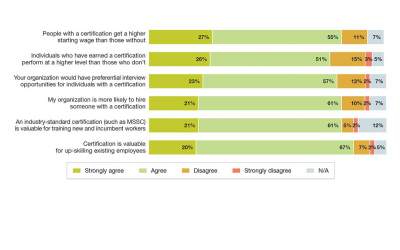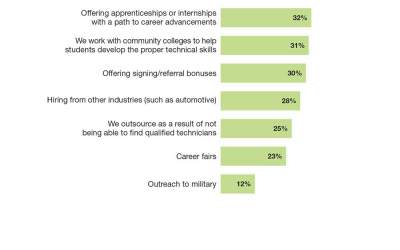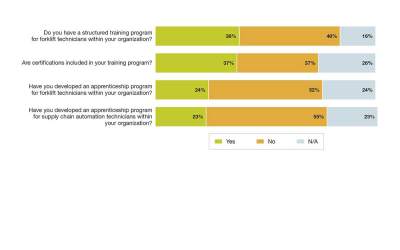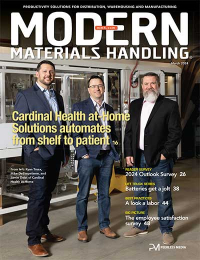MRO Survey: Finding and keeping the best technicians
Our annual maintenance, repair and operations (MRO) survey shows it’s become a little easier to do both, but challenges remain.
You could say the fever has broken.
For the recent past, hiring managers struggled to find and retain maintenance technicians. It’s been the case for lift truck techs and those for automation. And this has not been trivial.
But in Modern’s annual maintenance survey, 10% of hiring managers now say they “have a very difficult time hiring and retaining technicians.”
A year ago, that number was 20%. Two years ago, 22% used the word “difficult.”
And while this challenge has not entirely gone away, the trend is certainly in the right direction.
Better yet, it holds up on the other end. This year, 18% say hiring techs is no issue at all. That’s a 50% increase (up is good here) from last year’s number. Which, believe it or not, was a 100% increase from our report in 2022 when it was 6%.
Yes, the fever has broken. But that doesn’t mean hiring managers have a clear path ahead as challenges remain.
Before we get to those, you’re probably wondering who’s giving us this good news.
On behalf of Modern Materials Handling, Peerless Research Group surveyed readers late last year not just on ease of hiring but also on:
- the current state of preparedness of applicants for tech positions,
- the various problems facing hiring managers in getting the right people,
- the value of certification,
- top skills sought,
- problems faced when hiring/retaining techs, and
- salary ranges for both lift truck and automation techs.
The nearly 150 respondents work primarily in manufacturing (55%) with the balance in various forms of warehousing and distribution.
Top industries represented are automotive and transportation equipment as well as chemicals and pharma. Other industries represented include computers/electronics, fabricated metals, industrial machinery and electrical equipment.
Almost 80% of respondents either make MRO purchase decisions or make recommendations regarding those decisions. And 18% say MRO management is their main responsibility. For 44%, MRO management is one of their responsibilities. The balance have input to these decisions.
Or, to cut to the chase, we talked to the people who rely heavily on techs to keep their operations running without interruption. These managers are fully invested. Here’s where their heads are on the job in front of them.

What’s a tech worth?
While it’s never great form for any job applicant’s first question to be: “What does this job pay?” We’ll deal with that upfront in this story.
According to Modern readers, the top salary for lift truck techs is $59,775. And for automation techs the top is $62,125. Both numbers are actually slightly lower than a year ago.
The survey also showed a slight decrease in base salary for lift truck techs ($45,140). The base salary for automation techs decreased to $52,490.
How many are prepared?
Now that we know what tech jobs pay, let’s get into their level of preparedness for the job. Respondents’ answers break easily into three groupings.
- Applicants for forklift techs are either extremely or very prepared: 34%.
- For automation techs, that number is 33%.
- In the “somewhat” or “not very” prepared category are 58% of applicants for lift truck jobs and 57% for automation.
Fortunately, 7% of applicants for lift truck positions are not at all prepared. For automation, that number is 10%.
Now, it would be simple if those findings directly parallel the top line findings we mentioned earlier. While they don’t numerically, they do in a broader sense.
For instance, 10% have a difficult time finding people, and 10% or so are poorly prepared.
At the top end, 34% of applicants are really ready to do the job. Meanwhile, 18% say finding techs is not an issue.
Then there’s the great middle. Roughly 57% say applicants are somewhat or not prepared. Meanwhile, 72% say hiring is somewhat of an issue or a minor issue.
While the two sets of numbers don’t exactly line up, they do clearly account for the great gray middle that befuddles tech hiring. Or, for that matter, most hiring decisions across most any enterprise.
And that is where the battle to find enough of the right people sits today when it comes to hiring MRO techs.
Key skills
The survey drilled down to identify skills and qualities desired in applicants. But that’s not easy.
Forty-five percent said finding the right skills is a problem. And that is the top problem they have when it comes to hiring.
Topping the list of skills for both lift truck and automation techs is, you guessed it, experience. That also came across in the use of words such as “trained” or “skilled.”
Softer skills also figured prominently. This list includes: dedicated, gratitude, hard-working, reliable and team oriented, to name a few. Others of note are: patience, not being lazy, quick learner, attention to detail and willing to work and learn.
By the way, 39% say it’s a problem to find and hire techs who are dedicated and responsible.
There’s also subject matter knowledge. Computer knowledge/literate rank high on the list. But interestingly enough, respondents used much more specific words when talking about automation compared to lift trucks. It’s worth noting that these are the words of survey respondents, not words suggested to them.
Key words for the latter are: electrical, mechanical, hydraulic and technical knowledge. And while hiring mangers want automation techs to be knowledgeable in those same broad categories, other key words are more specific: bearings and rollers, electric motors, programmable controller knowledge and robotics.
The value of certification
Before moving on from the hiring process, we need to cover certifications of techs.While experience is the best certification of all, formal certification programs for both lift truck and automation techs are available. Two key sources here are MHEDA (Material Handling Equipment Distributors Association) and MSSC (Manufacturing Skill Standards Council). Both offer comprehensive certification programs.
Which brings us to: Are applicants with a certification better prepared to repair and maintain automated systems?
Three quarters of respondents say yes. So, not much question as to the value of those programs now that thousands of students have passed through them.
That brought us to a series of six questions about the relative value of those certifications. The chart on page 57 details those results.
In a world where it’s difficult to get people to strongly agree or agree on much of anything, there isn’t much question as to the value of certifications.
Retain who you hire
This brings us to the matter of retaining techs. There are no gimmes. Retaining people is still hard—say 37% of survey respondents.
Let’s start with three top distractions:
- Competitors offer a higher wage and “steal” our technicians (24%)
- Our technicians regularly move on to other (better) opportunities (22%), and
- A lack of funding (14%).
So, what’s being done to retain them? As the chart on page 58 shows, apprenticeships/internships are at the top of the list. That’s followed by working with community colleges and bonuses.
It’s also worth noting that upskilling techs is another tool for retaining them. It all ties in with building career paths, of course. In fact, 87% of survey respondents either strongly agree or agree that certifications are important for up-skilling existing employees.
We also asked what programs individual companies have in place to retain techs. The chart above has the details.
There’s also the matter of money to retain people who have completed training programs or apprenticeships. As new skills are demonstrated, 41% of respondents indicate an increase pay.
Very surprisingly, 59% either flat out don’t increase pay for better skills or say there is no linkage between the two.

Looking to the future
With all of that said, we wondered how well staffed companies are with lift truck and automation techs. In both cases, about a third say they’re adequately staffed right now and expect that to be the case going forward.
Which leaves two-thirds of respondents wishing they had more techs. However, those shortages are not extreme, at least in terms of numbers of people.
Roughly 50% of all respondents say they would like to have one to five more techs on staff. Given all the variables at play here, that’s probably not a bad place to be.
In fact, the status of lift truck and automation techs has improved noticeably in the past year. We’ll check back in a year from now to see what kind of momentum that trend has going forward.

Article Topics
MHEDA News & Resources
60 Seconds with Robert Martichenko of American Logistics Aid Network MRO Survey: Finding and keeping the best technicians Zion Solutions Group recognized with MHEDA’s Most Valuable Partner award in consecutive years Modex 2024 show planner 60 Seconds With Liz Richards, CEO or the Material Handling Equipment Distributors Association (MHEDA) Carolina Handling receives 2023 MHEDA MVP Award 60 Seconds with…Donna Varner Director of Events for MHI More MHEDALatest in Materials Handling
Geek+ and System Teknik deploy PopPick solution for pharmacy group Med24.dk Beckhoff USA opens new office in Austin, Texas Manhattan Associates selects TeamViewer as partner for warehouse vision picking ASME Foundation wins grant for technical workforce development The (Not So) Secret Weapons: How Key Cabinets and Asset Management Lockers Are Changing Supply Chain Operations MODEX C-Suite Interview with Harold Vanasse: The perfect blend of automation and sustainability Consultant and industry leader John M. Hill passes on at age 86 More Materials HandlingAbout the Author
Subscribe to Materials Handling Magazine

Find out what the world's most innovative companies are doing to improve productivity in their plants and distribution centers.
Start your FREE subscription today.
April 2024 Modern Materials Handling

Latest Resources















